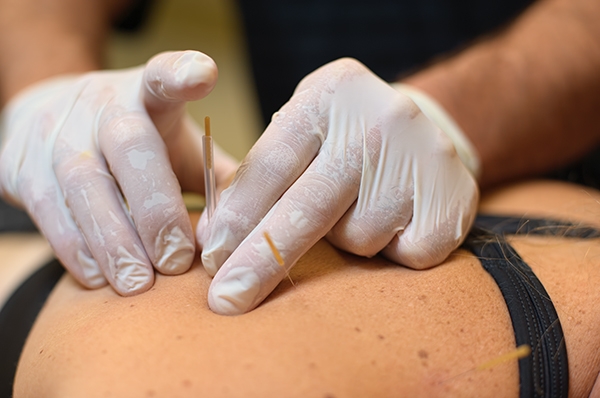Functional Dry Needling (FDN), also known as trigger point dry needling and intramusculature stimulation, involves the use of solid filiform needles in order to treat skeletal muscle and connective tissue dysfunction. This powerful intervention is effective at treating overuse injuries such as muscle strains, myofascial pain (a.k.a. knots), and tendinitis. When combined with neuromuscular electrical stimulation, FDN has been shown to increase muscle activation by facilitating the mind-muscle connection in patients with neurological conditions such as MS, ALS and stroke. Research supports that dry needling improves pain control, reduces muscle tension, normalizes biochemical and electrical dysfunction of motor end plates, and facilitates an accelerated return to active rehabilitation.
Benefits
- Fast Relief: Say goodbye to muscle soreness and tightness.
- Improved Movement: Experience better flexibility and range.
- Enhanced Circulation: Enjoy increased blood flow to vital muscle areas.
- Swift Healing: Benefit from faster tissue repair and reduced inflammation.
- Optimal Muscle Function: Achieve improved muscle strength and responsiveness.

Frequently Asked Questions
Is it painful?
Sharp pains are possible, however, most people describe a dull ache or deep pressure during the treatment. After treatment you may or may not experience soreness that feels similar to when you’ve completed a hard workout.
Is it safe?
Dry needling is a very safe procedure when performed by a trained professional with in-depth knowledge of the human anatomy. Risks are easily mitigated with safety precautions and your provider will inquire about any conditions that would preclude treatment. When properly delivered, it has a low rate of mostly minor adverse effects; chiefly bruising and muscle soreness.
Can I still participate in activity afterwards?
Yes! FDN typically results in decreased soreness and an improved mind-muscle connection. Implementing activity following treatments maximizes the effects of a corrective exercise. The worst thing you could do for yourself after needling would be to sit on the sidelines.
Who shouldn’t get dry needling?
Immunocompromised individuals, people with uncontrolled anticoagulants, or anyone with a local infection or active tumor near the painful area that needs to be treated. If you have an autoimmune disorder, are pregnant, have diminished mental capacity, or have recent surgery, then you should talk to a physical therapist to weigh the benefits of dry needling for your situation.
Is this the same thing as acupuncture?
Aside from the needle itself, FDN and acupuncture are very different treatments in both their approaches and their effects. FDN will treat specific anatomical structures (muscle, tendon, nerve) via direct, local stimulation in order reduce inflammation or facilitate muscle activation. Whereas, acupuncture involves inserting needles along certain lines called “Meridians” in order to achieve a balance and may not actually go into the sore muscles.
